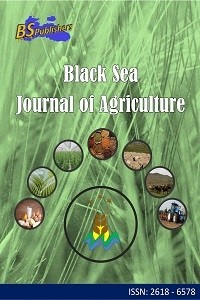
Black Sea Journal of Agriculture
Yazarlar: ["Zehra SARIÇİÇEK"]
Konular:-
DOI:10.47115/bsagriculture.1169680
Anahtar Kelimeler:Climate change,Heat stress,Animal nutrition,Production,Product quality,Solution suggestions
Özet: This article has been prepared to examine the effects of heat stress on livestock nutrition, yield and product quality, and to reveal strategies for adaptation and mitigation of climate change. Global climate change is primarily caused by greenhouse gas emissions, which result in warming of the atmosphere. Therefore, soil, air, water pollution and reductions in biodiversity may occur. At the same time, climate change can directly and indirectly affect livestock and animal nutrition. Heat stress results from inability to dissipate enough heat to maintain homeothermy of the animals. High ambient temperature, relative humidity and radiant energy compromise ability to dissipate heat of the animals. Ruminants, pigs and poultry are susceptible to heat stress due to their species-specific characteristics such as their metabolic rate and growth, high yield levels, rumen fermentation, sweating disorder and skin insulation. The indirect effects of climate change on livestock are changes in crop and forage production and quality, decrease in pasture/rangeland quality as a result of decrease in biodiversity and decrease in water availability. The direct effects are on the feed and water consumption, growth, milk, meat, egg, wool/hair and honey yield and product quality of the animals. These effects are primarily the result of a combination of temperature and increase in atmospheric carbon dioxide concentration, variation in precipitation, and relative humidity. Heat stress can cause significant losses in animal production, some of these may be immediate and some may be delayed. Animals under heat stress can decrease feed consumption to reduce metabolic heat. The decrease in feed consumption may cause a decrease in the growth rate of animals, decrease in milk, meat, egg, wool/hair yield and quality. The rations of animals can be manipulated to mitigate the negative effects of climate change.